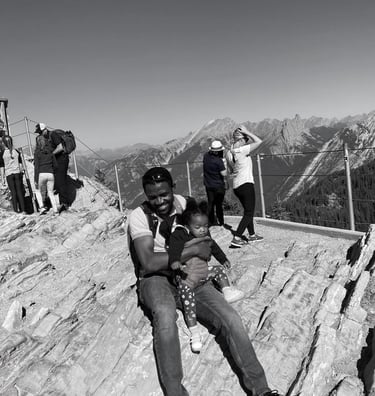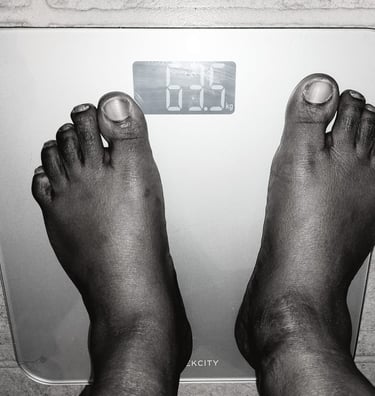Believing for the Impossible
I believe many of us have been in situations where our strength, our resources, or our knowledge have run out... If that’s you, I want you to be encouraged—God sees you. He hears you. And just as He did at the wedding in Cana, He can step in for you.


Scripture Reference: John 2:1–11
1 On the third day there was a wedding at Cana in Galilee, and the mother of Jesus was there. 2 Jesus also was invited to the wedding with his disciples. 3 When the wine ran out, the mother of Jesus said to him, “They have no wine.” 4 And Jesus said to her, “Woman, what does this have to do with me? My hour has not yet come.” 5 His mother said to the servants, “Do whatever he tells you.” 6 Now there were six stone water jars there for the Jewish rites of purification, each holding twenty or thirty gallons.[a] 7 Jesus said to the servants, “Fill the jars with water.” And they filled them up to the brim. 8 And he said to them, “Now draw some out and take it to the master of the feast.” So they took it. 9 When the master of the feast tasted the water now become wine, and did not know where it came from (though the servants who had drawn the water knew), the master of the feast called the bridegroom 10 and said to him, “Everyone serves the good wine first, and when people have drunk freely, then the poor wine. But you have kept the good wine until now.” 11 This, the first of his signs, Jesus did at Cana in Galilee, and manifested his glory. And his disciples believed in him.
When we think of Jesus turning water into wine, many of us see it as a simple story about a party running out of drinks. But this miracle, the very first one recorded in the Gospel of John, is a powerful demonstration of God’s interest in our everyday lives, His timing, and His ability to turn impossible situations around for our good.
In 2020, as the world reeled from the shock of the COVID-19 pandemic, my family found ourselves in a seemingly impossible situation. We had quit our well-paying jobs and were ready to move from our home country to Canada. A few days before our flight, the world shut its borders. We had a three-year-old child, I was heavily pregnant, and we were suddenly stuck without jobs, without certainty, and without the means to move forward. Like the situation at Cana, we needed God to turn our “water” into wine. Our “wine” had run out and we needed a miracle.
Whether or not your story mirrors ours, I believe many of us have been in situations where our strength, our resources, or our knowledge have run out. And maybe some of us are in that place right now. If that’s you, I want you to be encouraged—God sees you. He hears you. Just have faith in Him. Your water will turn into wine.
Here are some things we can learn from the story in John 2:
1. Jesus Is Interested in Your Everyday Life (John 2:1–3)
How do I know Jesus cares about the little details of our lives? Because He showed up at a wedding in Cana. Think about it—He could have chosen to focus on what many would call “more spiritual” matters, yet He chose to attend a celebration. Why? Because it mattered to the people hosting it, and they mattered to Him. That same Jesus cares deeply about you too. So what were weddings like back then? Let’s dive into the scripture to learn more.
John 2:1-3 - “On the third day there was a wedding at Cana in Galilee, and the mother of Jesus was there. Jesus also was invited to the wedding with his disciples. When the wine ran out, the mother of Jesus said to him, ‘They have no wine.’”
This wedding took place in Cana of Galilee, just a few miles from Jesus’ hometown of Nazareth. The short distance may explain why He, His disciples, and His mother attended so easily. The text doesn’t tell us the exact relationship between Jesus and the couple, but it’s possible they were relatives or close family friends—especially since Mary was also there. What we do know is this: it was important enough for Jesus and His family to attend.
Weddings in ancient Jewish culture were major events, often lasting several days—sometimes even a week! These celebrations were filled with joyful rituals, feasting, drinking, music, and dancing. Families would go to great lengths—and great expense—to ensure their guests felt honored and well cared for. Now imagine the embarrassment and shame that would come if the wine ran out halfway through. In a culture where hospitality was sacred, this wasn’t just a social hiccup; it could be seen as a serious failure. That’s why Mary acted quickly.
As someone from Nigeria, I can completely relate to this situation. In many Nigerian cultures, weddings are major affairs, sometimes stretching over multiple days and involving two or even three separate ceremonies—traditional, civil, and church weddings. These events are often filled with music, dancing, food, and pageantry. So, running out of food or drinks is almost unthinkable. It would bring deep embarrassment to the couple and their families. That’s why I understand the urgency in Mary’s voice when she told Jesus, “They have no wine.” She noticed the problem and took it straight to Jesus. She didn’t panic, gossip, or complain—she took the issue directly to the one she knew could handle it. Mary understood something many of us forget: if it matters to us, it matters to Him.
2. Don’t Lose Faith When the Answer Delays (John 2:4–5)
When Mary told Jesus that the wine had run out, how did He respond? Let’s take a look.
John 2:4-5 - And Jesus said to her, “Woman, what does this have to do with me? My hour has not yet come.” His mother said to the servants, “Do whatever he tells you.”
Wow—did that response surprise you? It probably surprised Mary too. First, Jesus addresses His mother as “Woman,” which might sound harsh to us, but in the culture of that time, it was a respectful—though formal—way of speaking. Still, it wasn’t the warm, mother-son tone we might expect. Then comes the second surprise: “What does this have to do with me? My hour has not yet come.”
Wait—didn’t we just establish that Jesus cared about this couple? Why didn’t He respond right away?
Here’s what I’ve learned in my walk with God: His ways are not our ways. Sometimes, the way He responds—or doesn’t respond—doesn’t make immediate sense to us. We pray, we trust, and then we get an answer that feels like a delay, or worse, a denial. But that doesn't mean God doesn’t care. It just means He sees the full picture, and His timing is perfect.
Mary didn’t argue. She didn’t panic. She simply turned to the servants and said, “Do whatever He tells you.” That’s faith. That’s trust in Jesus' character, even when His response seemed unclear. She believed that, in His time, He would act. She positioned others to be ready for a miracle—even before it happened.
When my family’s relocation plans were indefinitely delayed during the COVID-19 pandemic, it was a tough pill to swallow. We had prayed, fasted, and sought God’s will before even taking a single step. So when everything came to a standstill, we felt confused and discouraged. To be honest, we did panic a little. But in the midst of it, we reminded ourselves of the word God gave us from the beginning. We didn’t know how long we’d have to wait—or if it would ever happen—but we chose to trust Him anyway. We clung to His promise, even when everything around us said otherwise. And you know what? God came through. His timing wasn’t ours, but it was perfect.
As believers, we must learn to rest in the truth that God’s ways are higher than ours. We don’t always get the answer we expect, and that uncertainty can be unsettling. But faith is not about having all the answers—it’s about trusting the One who does. Romans 10:17 reminds us: “So faith comes from hearing, and hearing through the word of Christ.”
God’s Word builds and strengthens our faith. That’s why we must keep His promises before us, especially when the wait gets long or the answer feels delayed. Like Mary, we must trust Him enough to say, “Whatever He tells you to do, do it.” Because His hour will come, and when it does, everything changes.
3. Obey Him Even When It Doesn’t Make Sense (John 2:6–8)
John 2:6–8: “Now there were six stone water jars there for the Jewish rites of purification, each holding twenty or thirty gallons. Jesus said to the servants, ‘Fill the jars with water.’ And they filled them up to the brim. And he said to them, ‘Now draw some out and take it to the master of the feast.’ So they took it.”
When the moment finally came for Jesus to act, He gave what must have sounded like strange instructions. He asked the servants to fill six large stone jars—each holding twenty to thirty gallons—with water. These jars weren’t just any jars; they were used for Jewish purification rituals, where people washed to make themselves ceremonially clean before God. These were not containers anyone would associate with a miracle or a celebration. But that’s the beauty of it—Jesus used something ordinary and religiously symbolic to do something extraordinary and joy-filled. Jesus was repurposing what was meant for outward cleansing into a vessel for inward joy. He turned ritual into relationship, and law into grace. Then He told the servants to draw some water out and take it to the master of the feast—without telling them why or what He was about to do. There was no explanation, no buildup—just a simple command.
Imagine being one of those servants. You’ve just been asked to fetch what could amount to over 150 gallons of water—just water—and serve it to the master of ceremonies like it’s wine. You don’t know who this man Jesus is, you haven’t seen Him do any miracles, and His instructions make no logical sense. Honestly, if I were one of them, I might have hesitated. I would’ve wondered, “What are we doing with all this water? Isn’t the problem that the wine has run out?”
But their obedience tells us something important: you don’t have to understand the outcome to take the next step. Their obedience not only prevented what could have been a huge embarrassment for the couple, but it also became the very moment where Jesus revealed His glory.
Mary’s faith is inspiring—she trusted Jesus even when He said His time hadn’t come. But the obedience of the servants might be even more remarkable. They didn’t know Jesus like Mary did. They hadn’t seen any miracles. Yet when He spoke, they obeyed without hesitation. That’s the kind of trust God wants us to have. There will be times when His instructions won’t make sense. Times when the solution He offers doesn’t seem connected to the problem we’re facing. But we’re not called to understand every detail—we’re called to trust and obey.
Isaiah 55:8 reminds us: “For my thoughts are not your thoughts, neither are your ways my ways,” declares the Lord.
God is calling us to walk in complete obedience—even when it’s inconvenient, confusing, or uncomfortable. Because it’s in the place of obedience that the miraculous happens. It’s where water turns to wine. So don’t wait until it all makes sense. Don’t wait until you see the full picture. If He’s telling you to fill jars with water—just do it. Because on the other side of that obedience, there may be a miracle waiting.
4. The Blessings Are Worth the Wait (John 2:9–11)
I can only imagine what was going through the minds of those servants as they carried what they believed was still water to the master of the ceremony. Maybe they were nervous—unsure of what his reaction would be. Maybe they were anxious, wondering, “What if this doesn’t work?” But imagine their amazement when they saw his response.
John 2:9–11: When the master of the feast tasted the water now become wine, and did not know where it came from (though the servants who had drawn the water knew), the master of the feast called the bridegroom. and said to him, “Everyone serves the good wine first, and when people have drunk freely, then the poor wine. But you have kept the good wine until now.” This, the first of his signs, Jesus did at Cana in Galilee, and manifested his glory. And his disciples believed in him.
By the time the drink reached the master of the feast, the water had become wine. Now let’s consider this: when Jesus asked the servants to fill the jars, it was still just water. And even when they drew some out to take to the master, it was likely still water. If the water had already turned into wine in their hands, don’t you think they would have reacted? But they didn’t. They simply obeyed.
The miracle happened in motion. As they walked in obedience—even with uncertainty and no explanation—something supernatural took place. Somewhere between the drawing and the pouring, the water turned into wine. And it wasn’t just any wine—it was the best wine. The master of the feast was stunned. He didn’t know where it had come from, but he knew what he had tasted. And in that moment, Jesus’ glory was revealed.
This was the first miracle Jesus ever performed. It was a quiet one—no spotlight, no dramatic buildup. But it was powerful. And it was enough for His disciples to believe. It marked the beginning of their journey of faith.
I can truly relate to the disciples in that moment. My family had always trusted God and witnessed His goodness. But after waiting through a long and difficult season, the way God finally came through for us elevated our faith to a new level. When our relocation was delayed during the COVID-19 pandemic, it felt frustrating and disappointing at first. But when we finally moved, we realized that what we thought was a delay was actually God’s divine protection. Many people who relocated earlier suffered serious financial and emotional setbacks, but God spared us from that. Looking back, the blessing was absolutely worth the wait.
Psalm 25:3 says: “No one who hopes in you will ever be put to shame.”
Jesus didn’t just meet the need at that wedding—He exceeded expectations. Mary trusted Him, and He came through. The couple was saved from public embarrassment, and the disciples’ faith was strengthened. You may be walking in obedience and not seeing results yet. You might feel like you're just carrying “water,” while expecting “wine.” But don’t lose heart. Keep going. Your miracle may be happening in motion. Trust in God, and like Mary, believe that He will come through. Obey like the servants, even when it doesn’t make sense. Because when He shows up, He doesn’t just fix the situation—He brings joy, honor, and transformation.
I once read that in those days, wine often symbolized joy and celebration. So when Jesus turned water into wine, He wasn’t just solving a social problem—He was restoring joy and preserving the celebration. He ensured that what was meant to be a joyful occasion didn’t end in shame or sorrow.
Brothers and sisters, He can do the same for you today—if only you will trust Him. Mary saw a need and took it straight to Jesus—the only One who could truly help. The servants didn’t understand who Jesus was, but they recognized their limitations. Instead of questioning or resisting His instructions, they obeyed. And that simple act of obedience led to a miracle.
God is calling you to do the same. Surrender your impossible situations to Him. Obey His leading—even when it doesn’t make sense. You may not understand how or when, but if you trust Him and walk in obedience, blessings will follow.
Jesus still turns water into wine. He still restores joy. He still transforms what is ordinary into something extraordinary. All He asks is that you trust and obey.
MORE POSTS





-AR0zZR1ZERC46LxB.png)
-AR0zZR1ZERC46LxB.png)



